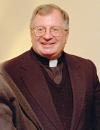Issue Date: August 15, 2003
Jesuit Fr. Drew Christiansen allowed a rare insight into the bishops’ environment policy, which he termed a “thorny thicket” about which they were “not conservative, but cautious.” Three years after publishing their 1991 pastoral letter, “Renewing the Earth,” they took a “quite deliberate” advocacy position on the environment, ever aware of their critics and knowing that none among them was an expert in science or economics. Christiansen, an adviser to the U.S. bishops’ conference, recalled that just when the bishops were sculpting their ecology policy, the Newt Gingrich Revolution had claimed both houses of Congress and was out to roll back environmental legislation with four devastating measures, known as the “takings” legislation. The bishops commissioned a paper on the common good and private property from David De Cosse, then a graduate student at Boston College. Christiansen and his staff revised the paper to better suit the bishops’ advocacy needs. Meanwhile the Clinton White House heard about the document and asked to see it. The conference made clear that it was an unofficial working paper. Without the bishops’ knowledge, the paper got passed to Senate Majority Leader Bob Dole who, Christiansen said, read it, was convinced and “takings” was withdrawn from consideration. “We did no lobbying,” the priest said. “Catholic social teaching … did all the work.” Christiansen shared the story because it illustrates that Catholic social teachings, while far from the ideology of free marketers, “have considerable weight in shaping wise environmental and social policy.” At its heart the Catholic theology of the environment is rooted in the biblical notion of the sovereignty of God and in the patristic idea of “the universal purpose of created things,” he said. The sovereignty of God means humans have no absolute dominion over nature, but must use it in accord with the divine purpose. That is as true for business, industry and government as it is for individuals, social and religious groups, he added. The Catholic concept of the common good is a major component of environmental justice, said Christiansen, a theologian and associate editor of America magazine. The common good is concerned with the distribution of burdens and benefits across a whole society. With an ever-smaller “global commons,” that concern now extends to the whole world. Catholic concern for the common good means that “economic development ought not take place to the detriment of the health of a community,” Christiansen said. -- Patricia Lefevere National Catholic Reporter, August 15, 2003 |
